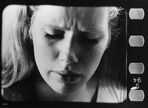So, what is Bergman's attitude towards such people? I think, all he wants to do is "present". Showing that human beings are under their own attributes, those who realize the various social roles of fathers, teachers, and wives are just "meanings" and "masks" created by human beings themselves. Once this kind of mask is exposed, why do humans live? What does "I" stand for? Is it the wife's father? Apparently not, it's just a role given to me by social norms. The position of the female patient in the film is set as "actor", which is no coincidence, because it is the actor's job to play someone else. On the stage, the actor not only wears the mask of his own work, but also wears the role of the actor. Masquerade. As an actor, it is easier than ordinary people to realize the meaningless falsehood that shrouds the entire human society. So the actor left both her job and her husband and son, and even tore it up when she saw the photo of her son, because that would arouse her awareness of the social identity norm of "mother". And silence is the strongest, silent resistance to all of this. She longs to be an observer, just like the father in "Still in the Mirror" observes his daughter. At this time, she has broken away from the constraints of human society, and has truly become an "outsider" in Camus's writings.
Watching Bergman's films must be based on the background of the times at that time. It was an era when human beings were just recovering from the pain of World War II. Too many lives were disillusioned and lost in the war. And the picture of the little boy raising his hand in surrender is well displayed. At the same time, the post-industrial era has just begun, and people are entering a new and unfamiliar era that is completely different from tradition. When modern technology and social division of labor are refined to facilitate life, they also classify human attributes mechanically, as if we It is no longer an individual with a dominant will, but only the screw of social construction. As a result, the philosophical circle draws nutrients from social history and forms factions such as existentialism and irrationalism. Existentialism explores the value of human existence, why we should actively live, and what is the meaning? All of Bergman's films explore this disconnection and loss of self-identity between man and society.
In the movie, this becomes what the nurse says: "Believe in one thing and do it, and think your life has meaning because of it." But her actions are insincere, she thinks she only needs to get married once , will give birth to children to love, and play the role of "wife". Even if she really loves the profession of nursing, she may not be able to tell. Just like most of us ordinary people, we follow the subconscious requirements and norms of society and put on those "masks" that people admire. We even deceive ourselves, thinking that that is what we really love and are worth fighting for. .
At this time, the actor just listened quietly. The nurse went from being close and loving at the beginning to being angry after seeing the contents of the letter. see it? Every time she speaks, there is only the nurse's camera, and the actor spends most of the time outside the painting. She is not only talking to the audience in front of the camera, but also muttering to herself in a mirror, cutting open her inner world. Stare for a long time. Therefore, she is afraid of being observed silently. For her, the longer she spends with the actors, the easier it is for her to fall into the panic when the mask is torn apart.
This finally broke out when the nurse asked the actor to speak, and the actor remained silent. She wants the actor to speak, and the subtext is: Hurry up and talk to me in human language - social identity, because I am afraid, I am an ordinary person, after being separated from social identity, I will only be in the emptiness of life sinking for a long time.
So when the actor rejected her, she would have such a big reaction.
That night, the nurse observed the actor: she slept peacefully, her teeth were ugly open, her neck had traces of makeup, her pulse was clearly visible. All of this is to find traces of "ordinary people" in actors and form social identity. The attempt was futile, the practice was nothing but self-deception, and with intensely twisted jealousy, the nurse finally became sick and broke - mentally castrated the actor, forced to speak, returned to social identity, and left contented .
The mask is the meaning I mentioned above, and it is also the behavior of the nurse under the panic, jealous of the actor's beautiful family, and trying to play the other party to get rid of the panic. Bergman does not provide a solution, as I said, he only presents the proposition of the human being and the actions that take the obligatory role to look directly at that proposition.
View more about Persona reviews










